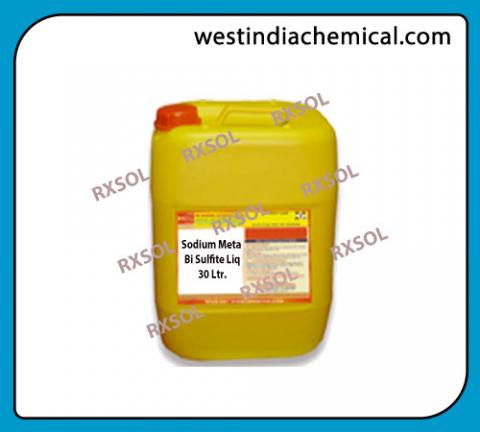Primary tabs

Sodium Meta Bi Sulfite Liq
SKU::RXSOL-42-1496-025
Used as a disinfectant, antioxidant and preservative agent. It is used as a cleaning agent for potable water reverse osmosis membranes in desalination systems. It is also used to remove chloramine from drinking water after treatment. Also used in printing and dyeing and dechlorination of textile a
Sodium metabisulfite is an inorganic compound frequently used as a disinfectant, antioxidant and preservative agent. It is used as a cleaning agent for potable water reverse osmosis membranes in desalination systems. It is also used to remove chloramine from drinking water after treatment.
Also used in printing and dyeing and dechlorination of textile after bleaching , sulphonated agent and reducer of chemical industry and pharmacy. Bleach of paper pulp,bamboo and timber bleach of stapk treatment agent of waste water , rubber solidifying agent , perfume industry is served as hydrocarbon perfume aldehyde.
|
Molecular Formula |
Na2S2O5 |
|
Molecular Weight |
190.10 |
|
White or Yellowish crystalline powder |
|
Dechlorination
When RO or NF membrane is used in the RO/NF process, the feed must be dechlorinated to prevent oxidation of the membrane. RO membranes have some chlorine tolerance before noticeable loss of salt rejection is observed. The first sign of chlorine attack on RO/NF membrane is loss of membrane flux followed by an increase in membrane flux and salt passage. Eventual degradation may occur after approximately 200–1,000 hours of exposure to 1 mg/L of free chlorine (200–1,000 ppm-h tolerance). The rate of chlorine attack depends on various feed water characteristics. Under alkaline pH conditions, chlorine attack is faster than at neutral or acidic pH. An acidic pH is preferred for better biocidal effect during chlorination. Chlorine attack is also faster at higher temperatures and higher concentrations of heavy metals (e.g., iron), that can catalyze membrane degradation. Since oxidation damage is not covered under warranty, Technical person always recommends removing residual free chlorine by pretreatment prior to exposure of the feed water to the membrane. Other oxidizing agents such as chlorine dioxide, hydrogen peroxide, ozone, and permanganate are capable of damaging RO/NF membranes also if not used properly.
Residual free chlorine can be reduced to harmless chlorides by activated carbon or chemical reducing agents. An activated carbon bed is very effective in the dechlorination of RO feed water according to following reaction:
C+2Cl2 +2H2O→4HCl+CO2
Sodium metabisulfite (SMBS) is commonly used for removal of free chlorine and as a biostatic. Other chemical reducing agents exist (e.g., sulfur dioxide), but they are not as cost-effective as SMBS.
When dissolved in water, sodium bisulfite (SBS) is formed from SMBS: Na2S2O5 + H2O → 2 NaHSO3
SBS then reduces hypochlorous acid according to: 2NaHSO3 + 2HOCl → H2SO4 + 2HCl + Na2SO4
In theory, 1.34 mg of sodium metabisulfite will remove 1.0 mg of free chlorine. In practice, however, 3.0 mg of sodium metabisulfite is normally used to remove 1.0 mg of chlorine.
The SMBS should be of food-grade quality and free of impurities. SMBS should not be cobalt-activated. Solid sodium metabisulfite has a typical shelf life of 4–6 months under cool, dry storage conditions. In aqueous solutions, however, sodium bisulfite can oxidize readily when exposed to air. A typical solution life can vary with concentration as follows:
Concentration (wt %) Solution life
10 1 week
20 1 month
30 6 months
Although the dechlorination itself is rapid, good mixing is required to ensure completion. Static mixers are recommended. The recommended injection point is downstream of the cartridge filters in order to protect the filters by chlorine. In this case, the SMBS solution should be filtered through a separate cartridge before being injected into the RO feed. Dechlorinated water must not be stored in tanks.
When RO/NF membranes are fouled with heavy metals such as Co and Cu, residual SBS (up to 30 ppm) partially converts to oxidants under the presence of excessive oxygen. When there is a heavy potential for metal fouling, SBS dosing amount control must be optimized and oxidation conditions of the concentrate must be monitored by an oxidation-reduction potential (ORP) meter.
The absence of chlorine should be monitored using an oxidation-reduction potential (ORP) electrode downstream of the mixing line. 175 - 200 mV threshold readings of the ORP have been typically applied. The electrode signal shuts down the high pressure pump when chlorine is detected.
Reaction :
1> When Sodium Meta-Bisulfite Reacts with water releases sulfur dioxide (SO2).
Released sulfur dioxide SO2 however makes the water a strong Reducing Agent.
2> Sodium metabisulfite releases sulfur dioxide in contact with strong acids
Na2S2O5 + 2 HCl → 2 NaCl + H2O + 2 SO2
3> On heating it releases sulfur dioxide, leaving sodium oxide behind.
Na2S2O5 → Na2O + 2 SO2
- Mordant;
- Dechlorinating agent;
- Reducing agent and sulfonating agent;
- Bleaching agent for bamboo, wood, paper fiber;
- Flotation reagent for nonferrous metals; waste water treatment chemical
|
Contents |
Industrial Standard (best quality) |
|
|
Na2S2O5 % ≤ |
38 - 42.0 |
|
|
Fe %≤ |
Iron, (Fe ppm)≤ 15 |
|
|
pH |
3.6 – 4.6 |
|
|
Sodium Sulfate, wt% |
≤ 3.5% |
|
| Specific Gravity @ 25degree C | 1.310 – 1.370 | |
| Density, lbs/gal @ 25 degreeC | 10.9 - 11.3 |
Properties
Molecular formula Na2S2O5, Na-O-(S=O)-O-(S=O)-O-Na
Molar mass 190.107 g/mol
Appearance white to yellow powder
Odor Faint SO2
Solubility in water 100%
Solubility Soluble in glycerol, Soluble in ethanol
Sodium Meta Bi Sulfite Liq manufacturer supplier distributor in Mumbai, Kandla, Kolkata, Vizag, Chennai, India, Fujairah, Dubai, Sharjah, UAE, Gulf, Middle East, Muscat Oman, Kenya Africa. Get the best quality of Sodium Meta Bi Sulfite Liq at a competitive price from us. We have ready stock of Sodium Meta Bi Sulfite Liq in India, UAE Gulf, Oman, Kenya Africa. Contact us for bulk as well as small orders.
EU Index 016-063-00-2 EU classification Harmful (Xn) Irritant (Xi) R-phrases R22 R31 R41 S-phrases (S2) S26 S39 S46
Dechlorination in municipal wastewater, pulp & paper, power, and textile water treatment plants
Oxygen scavenger
Boiler water treatment
Preservative in photo developer process
Food additive
Flue gas desulfurization
Mild reducing agent in organic synthesis
Efficiently remove traces or excess amounts of bromine, iodine, osmate esters, chromium trioxide, and potassium permanganate




